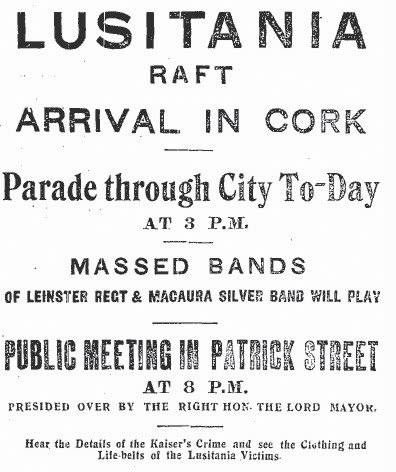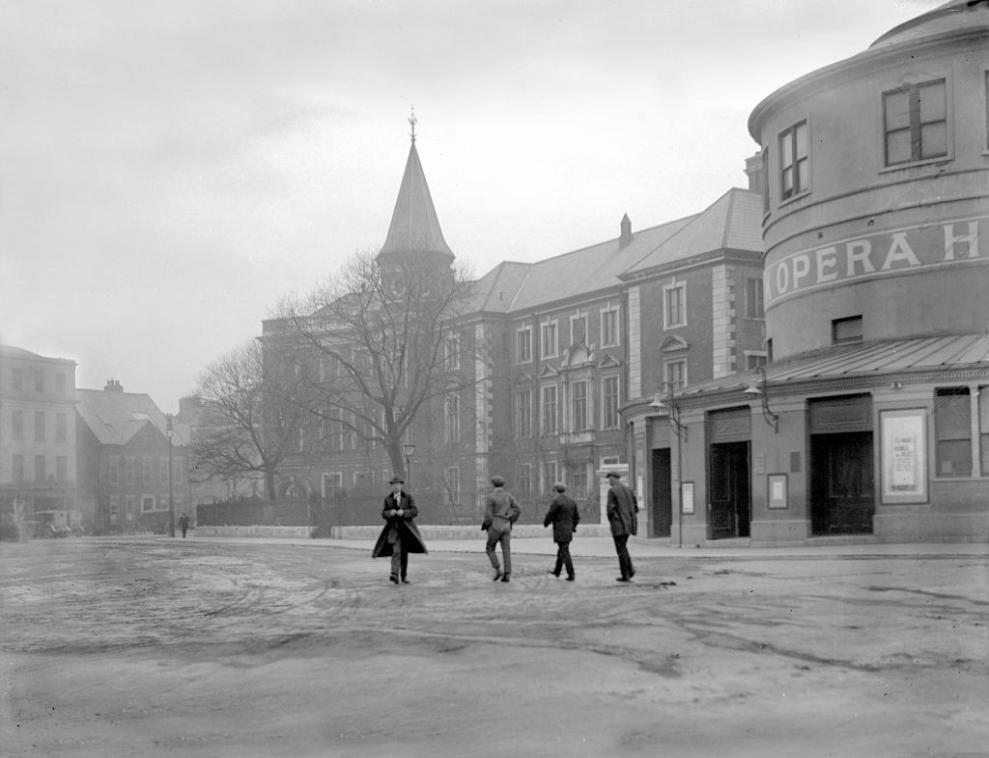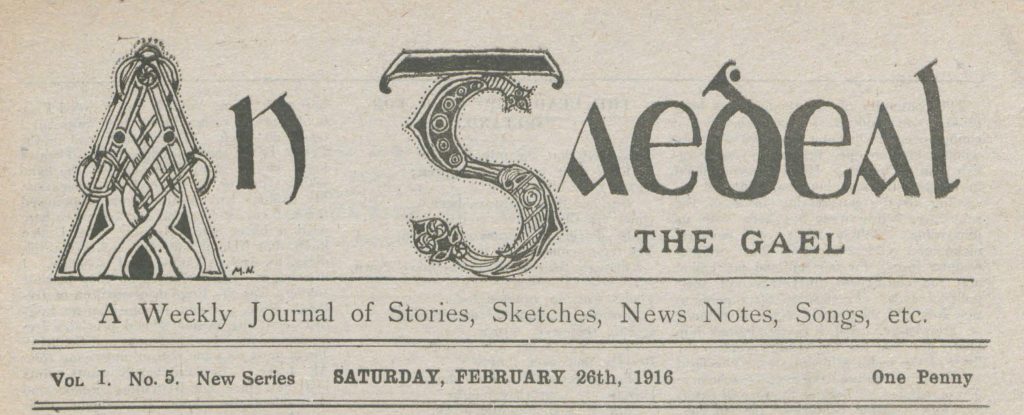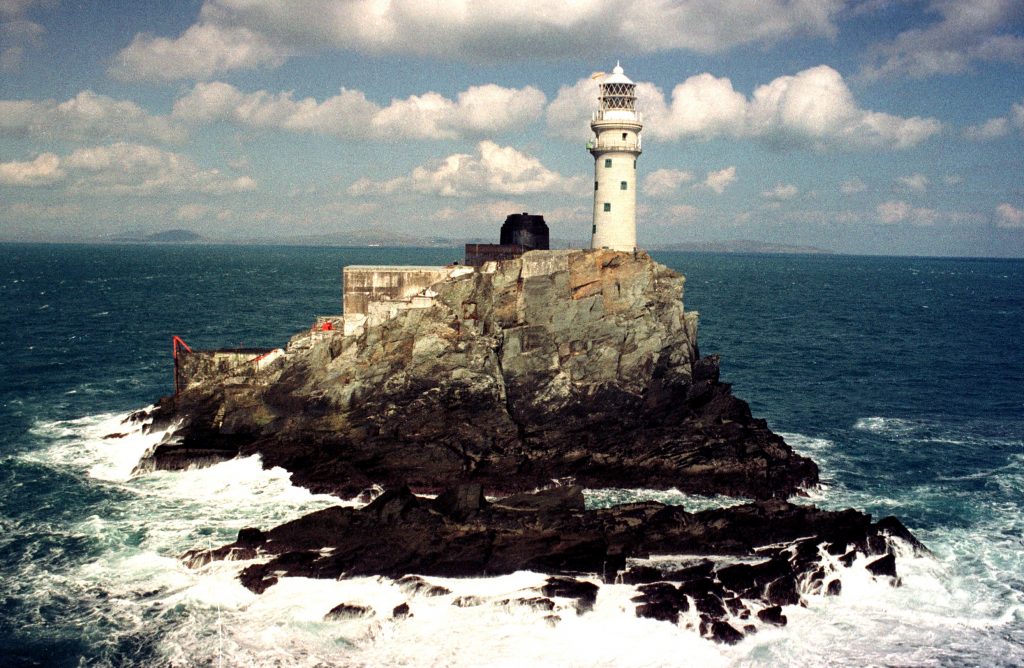In This Section
- Home
- Collections
- Atlas Resources for Schools
- Cork Fatality Register
- Mapping the Irish Revolution
- Mapping IRA Companies, July 1921-July 1922
- Mapping the Burning of Cork, 11-12 December 1920
- Martial Law, December 1920
- The IRA at War
- The Railway Workers’ Munitions Strike of 1920
- The Victory of Sinn Féin: The 1920 Local Elections
- The War of Words: Propaganda and Moral Force
- The IRA Offensive against the RIC, 1920
- De Valera’s American Tour, 1919-1920
- The British Reprisal Strategy and its Impact
- Cumann na mBan and the War of Independence
- The War Escalates, November 1920
- The War of Independence in Cork and Kerry
- The Story of 1916
- A 1916 Diary
- January 9-15 1916
- January 10-16, 1916
- January 17-23, 1916
- January 24-30, 1916
- February 1-6 1916
- February 7-14, 1916
- February 15-21, 1916
- February 22-27, 1916
- February 28-March 3, 1916
- March 6-13,1916
- March 14-20, 1916
- March 21-27 1916
- April 3-9, 1916
- April 10-16, 1916
- April 17-21,1916
- May 22-28 1916
- May 29-June 4 1916
- June 12-18 1916
- June 19-25 1916
- June 26-July 2 1916
- July 3-9 1916
- July 11-16 1916
- July 17-22 1916
- July 24-30 1916
- July 31- August 7,1916
- August 7-13 1916
- August 15-21 1916
- August 22-29 1916
- August 29-September 5 1916
- September 5-11, 1916
- September 12-18, 1916
- September 19-25, 1916
- September 26-October 2, 1916
- October 3-9, 1916
- October 10-16, 1916
- October 17-23, 1916
- October 24-31, 1916
- November 1-16, 1916
- November 7-13, 1916
- November 14-20, 1916
- November 21-27-1916
- November 28-December 4, 1916
- December 5-11, 1916
- December 12-19, 1916
- December 19-25, 1916
- December 26-January 3, 1916
- Cork's Historic Newspapers
- Feature Articles
- News and Events
- UCC's Civil War Centenary Programme
- Irish Civil War National Conference 15-18 June 2022
- Irish Civil War Fatalities Project
- Research Findings
- Explore the Fatalities Map
- Civil War Fatalities in Dublin
- Civil War Fatalities in Limerick
- Civil War Fatalities in Kerry
- Civil War Fatalities in Clare
- Civil War Fatalities in Cork
- Civil War Fatalities in the Northern Ireland
- Civil War Fatalities in Sligo
- Civil War Fatalities in Donegal
- Civil War Fatalities in Wexford
- Civil War Fatalities in Mayo
- Civil War Fatalities in Tipperary
- Military Archives National Army Fatalities Roll, 1922 – 1923
- Fatalities Index
- About the Project (home)
- The Irish Revolution (Main site)
Each week, we look back at what was “in the news” the same week 100 years ago – as reported in the Cork Examiner in 1916.
By Niall Murray, Irish Examiner
Monday, March 20, 1916
- SUNDAY HURLING LEAGUE
Owing to the inclemency of the weather, the matches between the first and second grades of Fair Hill and Brian Borus, in connection with the above competition, arranged for the Cork Athletic Grounds yesterday afternoon, had to be postponed.
- LIEUT. M. OLEARY, V.C
Lieut. Michael O’Leary . V.C, made his first visit to Newcastle on Saturday, and spoke at the opening of the Irish Flag Day. He was introduced by the Lord Mayor, and had a great reception. O’Leary said he could not make a speech, and the more he tried the worse he got.
Michael O’Leary from Inchigeela, Co Cork, was the first Irish soldier to win the Victoria Cross medal, when in February 1915 he killed 10 German soldiers while fighting with the Irish Guards in France. He subsequently became a reluctant poster-boy for army recruitment, particularly in Ireland.
Tuesday, March 21, 1916

Expeditionary Force, reported from the base under date 11th March, 1916 (privates unless otherwise stated): KILLED, 9th Royal Fusiliers—Murphy, W. 11th Rifle Brigade — O’Brien, T.; 2nd Irish Fusiliers – Cawley, W. DIED, 8th North Lancashire Regt. — McCarthy, T.; 1st Irish Fusiliers — O’RAwe, E.; 1st Irish Regiment — Butler, N.; 5th Irish Regt Faithful, W. WOUNDED, 1st Irish Rifles — Briggs, R.; Brooks, G.; Johnston. J.; McGladdery, J.; McIlwrath, C.; Potter, Lance-Corpl. E.; Sullivan, Lance-Corpl. M. 2nd Leinster Regt. – Cowan, C. Previously reported wounded, now reported not wounded: 2nd Munster Fusiliers — Byrne, P.

A view of Emmet Place, Cork in the 1920s showing the old Opera House. Picture: Irish Examiner
- OPERA HOUSE: “A PAIR OF SILK STOCKINGS.”
The Opera House was well patronised last night, when Messrs Allan Aynesworth and Bronson Albery’s Company presented the comedy, “A Pair of Silk Stockings,” by Mr Cyril Harcourt. The title of the work, perhaps, aroused the curiosity of some, and it is possible that a few people who had not seen it before might have misgivings about its good taste. Of course, in pure, downright comedy, a considerable amount of latitude is allowed by modern taste; and it must be said for the play that its general tone is unexceptionable, though in just a few parts of the dialogue the border line is drawn a trifle thin. Some might consider that one or two details in production might be omitted or recast without detracting from the value of the work. The characters, however, are all excellent people. There are no villians of either sex. Sam Thornhill and his wife are a very attached couple, but apparently having nothing else to quarrel about, have a difference as to which sort of motor car they ought to buy. The result is that “Molly” gets a car of her own and “Sam” one for himself. He allows her to divorce him, and so on; but they are both very sorry for one another, though neither will give way an inch…. Mr. Douglas Greet was extremely popular as the imperturbable stammering Sam Thornhill. Miss Jane Saville was a winsome Molly, who won the hearts of the audience.
- DOUGLAS PETTY SESSIONS
Sergeant McHugo, Blackrock, charged a domestic servant, named Kate Murphy, with having stolen £1 5s. 2d. And a suit of clothes from Mr. John McDonnell, Blackrock. He, the Sergeant, would not be able to complete the case that day, as five pawn tickets were found on the accused, and he had not time on Saturday to trace the goods they represented. Of course, the goods might be the property of the accused. He would have a couple of depositions taken and then ask for a remand.
Mr John McDonnell, Blackrock, said the prisoner was in his employment for a fortnight as a housekeeper. On the 29th of January he gave her £1 5s 2d to pay bills and get groceries for the week. He did not see the money or the groceries since. The next, time he saw the prisoner was on 17th March. On Monday, January 31st, he left his house at 2 o’clock p.m.. to go to work. In the house then there were four small children. When he returned that evening at 6.30 p.m. he missed a suit of clothes, value for about £3. The prisoner’s clothes were also gone. He had not seen the suit since. On the 17th March he met the prisoner at Summerhill South, Cork, with a little boy. When she saw him she ran away with the boy, and he ran after her. When she got near Sullivan’s Quay she put the child into a hall door and ran toward the Grand Parade. On the Grand Parade she got on a side-car, and he told the jarvey not to drive her, and he did not. Witness called a policeman and gave her in-charge. The only thing she paid with the £1 5s 2d was l0d for insurance money. The accused, when asked if she had any questions to ask the witness, made a long statement, in which she detailed how she had spent portion of the money, but had lost the rest. She did not take the clothes and would pay what she had lost back, if she got a chance.
Constable Robert Rainsbury, Blackrock, said he arrested the accused on St. Patrick’s Day, and charged her with the larceny of £1 5s 2d and a suit of clothes from Mr. John McDonnell, Blackrock. She admitted having got the money, but lost it, but she denied any knowledge of the clothes.
The majority of the bench decided she should not stand trial.
Wednesday, March 22, 1916
- IRISH PRISON SERVICE
It has been stated on reliable authority that the Irish Prison Board contemplate a reduction in the number of first-class prisons, so that some of those which come under that head will probably be partially abolished. It is supposed that Kilkenny and Tullamore will be amongst the first of the number specially singled out, and that the staffs engaged in these institutions will be provided with employment in England and Scotland, which must naturally be a considerable hardship on a number of men with families employed in these prisons.
- LUSITANIA RAFT PARADE
At 3 o’clock yesterday afternoon one of the rafts recovered from the Lusitania, at the time she was torpedoed was publicly paraded through the principal thoroughfares of the city. Escorted by the Brass and Reed and Pipers’ Bands of the Leinster Regiment and the Macaura Silver Band, Skibbereen, and a detachment of soldiers carrying rifles, as well as a company of the Protestant Boys’ Brigade, the parade was imposing. The raft, bearing the scars of its experience mounted on a lorry drawn by horses, was impressive inasmuch as it forcibly recalled the fateful day of May 7th, 1915, when the large transatlantic liner was sunk off the harbour, and the scenes of horror that followed the landing of the dead, and the condition of the rescued. The raft will be removed on Thursday to London, where it will be exhibited with a view to collect funds for the men engaged in mine-sweeping off the coast. Its passage through Cork was at the instance of Dr Macaura, and it was paraded solely to allow the citizens view the remnant of the liner. There was consequently no collection made in Cork.
- IRISH WHISKEY DISTILLERIES SHORTAGE IN SUPPLIES
Irish whiskey distilleries are going through an anxious period. Distillers are uncertain as to the intentions of Government departments, but do not consider there is any possibility of the commandeering of their plant and premises for other purposes. Neither are they very much agitated in anticipating Budget proposals. The fact is that the trade is generally upset by reason of enactments which prohibited the taking out of bond of whiskey until it was three years old. The effect of this beneficial law which stopped the sale of young whiskey is now forcing its regulation on the trade, and of course there is the usual disorganisation after the abolition of an old system. The first result naturally is that there is a shortage of supply. And the uneasiness of. the situation is greatly increased by shipping difficulties, and the consequent decrease in the importation of raw materials.
Thursday, March 23, 1916
- GALWAY MYSTERY
Charles Watson (50), engineer, believed to he a native of Grimsby; and Patrick Darcy (11), step-son of Martin O’Donoghue, publican, Cross Street, Galway, lost their lives at Galway Docks on Tuesday night under tragic and, in some respects, mysterious circumstances
Chief Engineer Watson came into the city with commands for his boat. He visited O’Donoghue’s, and left about 7.30, having previously requested little Patrick Darcy to assist him to carry a parcel. The boy readily complying, both left together for the dock.
All last night a patrol from the boat engaged in a futile search, and it was not until 10.50 to-day that Constable Kennedy of the docks station discovered the two dead bodies lying in the Dun Aengus Dock.
Friday, March 24, 1916
- BOY’S JUMP FROM TRAIN
On Tuesday a boy was being conveyed from Fermoy to Phillipstown Industrial School, when he managed to make his escape by jumping from the train. It appears that he got into a lavatory on the train while the attention of his escort was somehow diverted, and got out through the window of the lavatory on to the footboard. He travelled in this manner for some time, and was then seen by the guard, who slowed up the train near Cabra Bridge. Just then the escort moved the boy and one of them pulled the communication cord and had the train stopped, but the boy jumped from the footboard and made away across the field, when the train slowed down and the escort were just in time to see him disappearing away through the fields. When the train (due to arrive at Thurles at 3p.m.) got down to Thurles Railway Station the police escort, with Constable Barrett, R.I.C Thurles, cycled out to Cabra, and after a search found the lad sitting down by the side of a fence. He was brought down to the railway station and was brought on to Phillipstown by the 5 p.m. train.
Saturday, March 25, 1916
- CITY COURT
Denis Murphy, 17 1/2 years, living at Evergreen Road, who pleaded guilty to uttering worthless cheques at the City Commission on Wednesday, was sent to the Borstal Institute for a period of three years.
- NEWS FROM AURORA
The Minister for the Navy, Mr Jensen, “announces that early this morning the Naval Radio Station, Williamstown, and the Radio Station, Melbourne, received the following wireless message from the Antarctic ship Aurora:—
“Hull severely strained; ship released from ice March 14th, Latitude 64.30 South, Longitude 1.61 East; drift 500. Gase, commissariat officer; Richards, physician; Hayward, secretary; Jack, biologist, ashore. Wireless appeals for relief ship sent during winter as acknowledgment Ship proceeding Port Chalmers, New Zealand. Jury rudder. No anchors. Short of fuel. Expect arrive early April. – Stenhouse.”
NOT IN THE NEWS: MARCH 21-27
Many of the main players in the 1916 Rising featured regularly in newspapers of the time, but most of the activities relating to the Rising did not feature in the news and are only now known from information held in archives.
Monday, March 20, 1916
Police sergeant Aherne was shot and injured when the Royal Irish Constabulary (RIC) entered the Irish Volunteers’ rooms in Tullamore, Co Offaly. Accounts of what happened differ, the RIC saying the Volunteers wer following instructions to resist any attempt to seize their arms. Irish Volunteers honorary secretary Bulmer Hobson was quoted in newspapers as saying that a couple of revolvers went off in a scuffle after the Volunteers were attacked by police searching for arms and a hostile crowd that had followed them into their building.
Tuesday, March 21, 1916
In Tom Clarke’s absence, the senior Irish Republican Brotherhood (IRB) man’s shop in Dublin was visited by his brother-in-law Edward Daly, and Con Colbert. All three were executed after the Rising, now only a few weeks away.
Daly also met with senior Irish Volunteers figures at their headquarters in Dublin’s Dawson Street, including Michael Joseph O’Rahilly, Michael O’Hanrahan, Éamonn Ceannt, Thomas MacDonagh – four more men who would be dead within weeks. Others to visit the offices were Hobson, Kerryman Piaras Béaslaí, Michael Foley and Thomas Hunter – a draper’s assistant from north Cork, who would be sentenced to death but later serve as a TD in the first Dáil after the sentence was commuted.
Wednesday, March 22, 1916
Rifles and fixed bayonets were held by uniformed Irish Volunteers in the passage leading to their rooms at their headquarters during a meeting on Wednesday evening. According to Dublin Metropolitan Police (DMP) detectives watching the premises, among those who attended two meetings on this date were Seán MacDiarmada, Thomas MacDonagh and Ceannt, three of the seven-member IRB Military Council that was planning a Rising to begin at Easter weekend, unknown to the most senior Irish Volunteers figures until the days before.
Patrick Pearse, Colbert and Daly were at Tom Clarke’s shop in Parnell Street, where the owner was also in attendance.
Thursday, March 23, 1916
Alfred Cotton who had been deeply involved in planning the landing of German guns in Kerry – until recent orders to live in Belfast – was observed in Dublin by the DMP, including his attendance at a meeting in Irish Volunteers head office.
Colbert, Daly, Hobson, John Milroy and Gerald Griffin were among those at drilling of about 70 Irish Volunteers at 41 Rutland Square (now Parnell Square) in Dublin.

Friday, March 24, 1916
Police in Dublin seized copies of The Spark, The Gael and Honesty in shops, and raided the printing plant where The Gael and other newspapers were being produced. The DMP also surrounded the Irish Citizen Army’s Liberty Hall, where James Connolly and Countess Markievicz summoned members to protect his The Workers’ Republic newspaper. The raids caused “a good deal of commotion and anxiety among Sinn Feiners”, according to police reports of their actions.
Saturday, March 25, 1916
German submarines were sighted off the Fastnet Rock, south of the west Cork coast. On the same date, a Russian vessel was sunk by a torpedo south-west of the Fastnet. Fastnet Lighthouse, picture: Richard Mills.
Sometime around this date, near the end of March, a sister of IRB Military Council member Joseph Plunkett was sent to New York. She had not long returned from there, when she was despatched with a message for the IRB’s go-between John Devoy. He was to tell the Germans that the guns being sent to aid the Rising should not arrive before Easter Sunday.

German submarines were sighted off the Fastnet Rock, south of the west Cork coast. On the same date, a Russian vessel was sunk by a torpedo south-west of the Fastnet. Fastnet Lighthouse, picture: Richard Mills.
Sunday, March 26, 1916
During the final weekend of March, the Irish Volunteers’ full-time organiser in Cork Terence MacSwiney was seen by police visiting Tom Clarke’s shop in Dublin. He was also seen at Volunteers’ headquarters, where a General Council meeting was held, and in attendance were four men who would be among the seven signatories – Ceannt, MacDiarmada, MacDonagh and Pearse
The Volunteers’ General Council discussed treatment by Government forces of the Irish Volunteers and warned the public that “the general tendency of the Government’s action is to force a highly dangerous situation….”
Expansion of the Volunteers continued in rural Ireland, with 12 new members recruited at Ardfield outside Clonakilty in west Cork. Around 180 members of five companies had marched there carrying 30 rifles and 50 shotguns.
Sources:
Digitised copies of the Dublin Metropolitan Police ‘Movement of Extremists’ files for the corresponding dates in 1916 are uploaded regularly to the National Archives of Ireland website – www.nationalarchives.ie (@narireland).
Read some events from the period at the Military Archives timeline, and witness statements made by participants in the Rising www.militaryarchives.ie (Twitter @dfarchives).
Among the other sources used in this diary are monthly reports of the Royal Irish Constabulary inspector general and county inspectors, viewed in UCC’s Boole Library’s Special Collections department (@theriversideUCC).
— Compiled by Niall Murray
